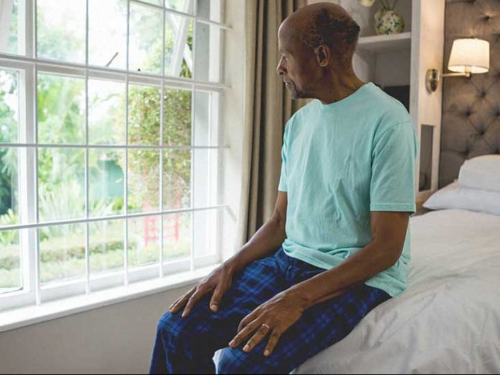It seems women over age 50 are not the only ones going through the bodily/emotional changes labeled as menopause; men are experiencing some hormonal drama as well. Male menopause or manopause is one of a few umbrella terms used to describe age-related physical/emotional changes that can affect seasoned men.
Hormonal ups and downs are a natural part of aging. Unlike the more dramatic reproductive hormone plunge that occurs in women during menopause, however, sex hormone changes in men occur gradually.
“Not every man will experience this. But the symptoms are very real,” says Luigi Simone, MD, a family medicine physician at Scripps Clinic Encinitas with a special focus on men’s health. “There’s a reason it’s called male menopause. It’s because it can produce many of the same symptoms as female menopause.”
What is male menopause or manopause?
A man’s testosterone levels decline on average about 1% a year after age 40. But most older men still have testosterone levels within the normal range, with only an estimated 10% to 25% having levels considered to be low.
Low testosterone levels in older men often go unnoticed. Testosterone levels can be checked by a blood test, but tests aren’t routinely done. And many men who have low testosterone levels experience no symptoms. In addition, the signs and symptoms associated with low testosterone aren’t specific to low testosterone. They can also be caused by age, drugs, or other health issues such as diabetes, hypothalamic-pituitary disease or being overweight.
In addition to a drop in testosterone, some men might also experience the following symptoms:
- low energy
- lack of sexual drive
- hot flashes or sweats
- sexual issues like erectile dysfunction
- sleep problems
- loss of muscle mass and strength
- increased fat accumulation especially around the middle
- depression
- breast discomfort
- reduced hair production
- decreased volume of ejaculate
Some medical professionals are still on the fence about labeling older men and the symptoms they’re experiencing with the term manopause. When testosterone levels drop in men, it occurs at a slower pace. The hormonal changes might take place as early as ages 45 to 50, and become more apparent after age 70 in some men.
How is manopause discovered?
A doctor will physically examine a patient thoroughly. Next, the physician will discuss your symptoms and order the appropriate testing to rule out other illnesses that can also be the cause of low testosterone. Blood work will be required to measure testosterone levels. Sometimes healthcare providers also will use questionnaires alongside a physical exam and lab work to make a final diagnosis.
Can manopause be treated?
If the results suggest you have a testosterone deficiency, you may be referred to an endocrinologist, a specialist in hormone problems. Testosterone replacement therapy (TRT) will probably come up in your discussions with your medical provider.
Quite similar to hormone replacement therapy in women, TRT in men also comes with some serious risks. TRT in individuals with borderline low or low-normal testosterone levels is yet to be proven effective and may not outweigh the risks. There are some doctors who may not be comfortable giving testosterone to a man who has coronary artery disease or a history of treated prostate cancer. Though further research is needed, TRT might stimulate the growth of metastatic prostate and breast cancer. TRT may also increase the risk of heart attack and stroke and contribute to the formation of blood clots in the veins.
Your doctor will likely recommend against starting TRT if you have conditions such as breast or prostate cancer, untreated severe obstructive sleep apnea, uncontrolled heart failure or thrombophilia (blood clotting issues), or if you’ve recently had a heart attack or stroke.
Before considering TRT, do your own research! Read about the therapy’s pluses and minuses, and then have a thorough conversation with your doctor about it.
If you have low testosterone levels, there are some things you can do to boost your body’s production as well as improve your overall health and well-being. If you are overweight, your healthcare provider will advise you on ways to lose weight like exercising safely, and changing your dietary habits. You should also limit your stress and address any sleep issues. Most people need about seven to eight hours of consistent sleep each night.
Make sure you are eating foods with zinc and vitamin D. These nutrients can help balance your hormones and help you produce more testosterone. Adult men need about 11 milligrams of zinc per day, which can be found meats, poultry, seafood, shellfish, beans, nuts, and whole grains.
Low testosterone can also affect your mental state. Consider speaking with a therapist to help get you on the right track. If your relationship is being impacted, you might want to try couples therapy.
